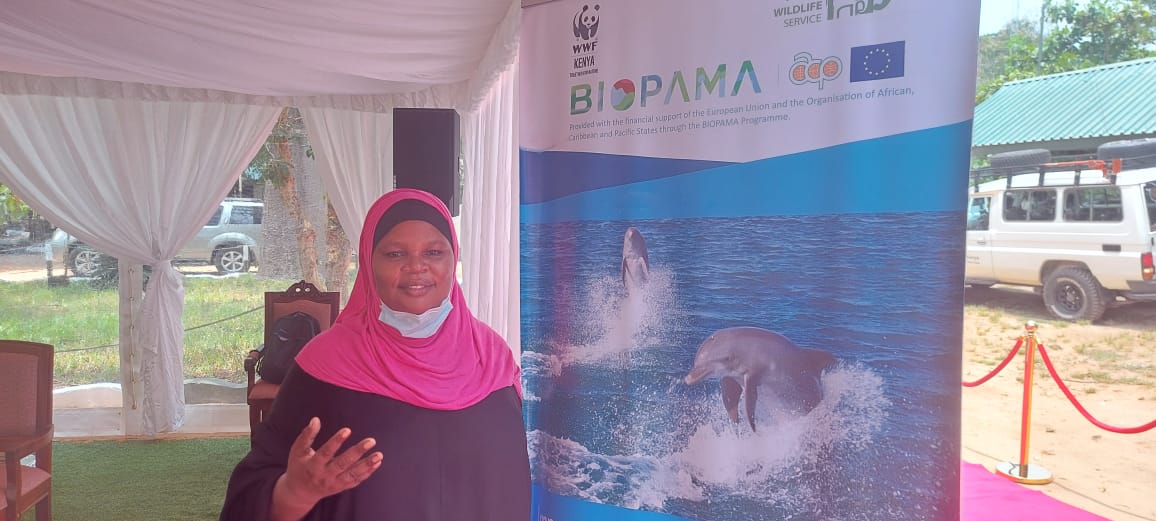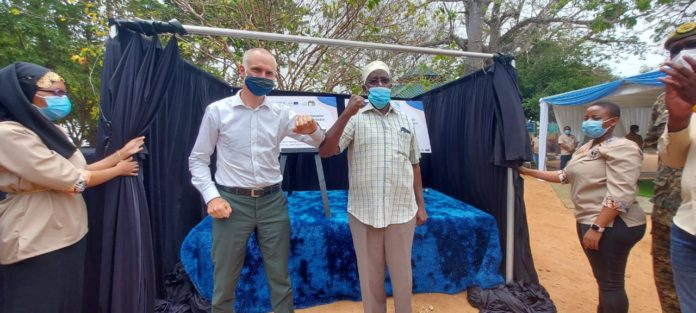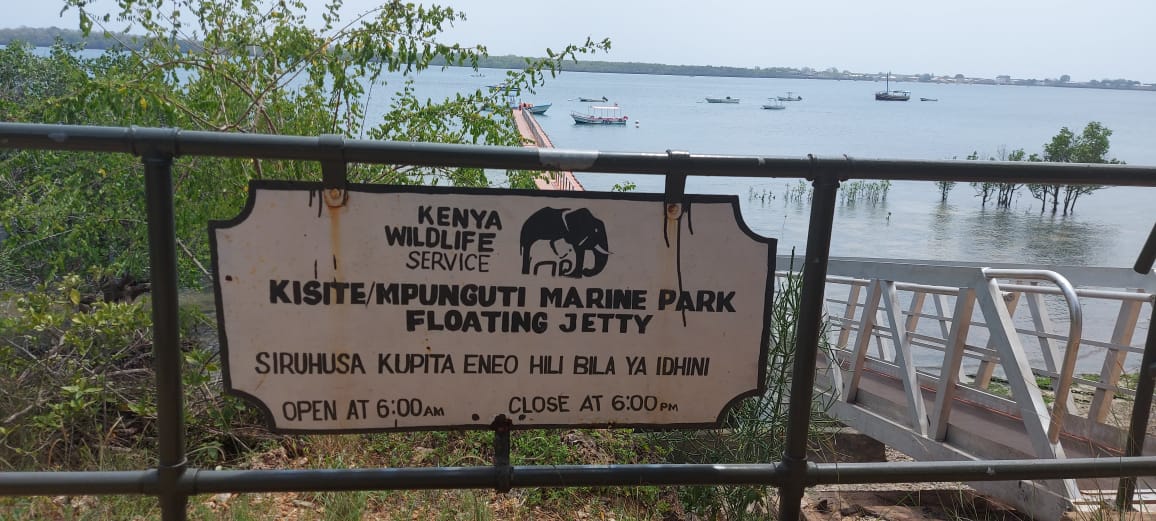By Winnie Kamau
Kwale, Kenya: The fetter supply of the Blue economy has various cadres and each fetter plays a critical and unique role in the ever growing sector. It is no wonder that women are calling for their own stake.
“Women in the fisheries sector are generally referred to as fish vendors, yet we contribute more to the ocean economy. The time for women to utilize their potential, unmatched skills and benefit fully from the blue economy sector opportunities, is now” The words of Mercy Mhanga, a member of the Coastal Women Fisheries, reverberated across Kisite- Mpunguti Marine Park headquarters in Shimoni Kwale county.
This is how she commenced her speech while addressing community members, beneficiaries and dignitaries from various sectors, during the launch of two multi-million European Union (EU) funded projects, targeting small scale fishers and estimated at 1.4million Euros (approximately over 184 million Kenya Shillings).
When she took the podium, Mercy echoed the words of American lawyer and jurist, the late Justice Joan Ruth Bader Ginsburg “Women belong in all places where decisions are being made. It shouldn’t be that women are the exception.”
The two projects are inclusive, and set to improve fortunes in Kwale County with the biggest beneficiaries being women and youth. A move Mercy Mahanga said could change how women do business in the sector. “This is expected to enhance women and youth owned businesses which rely on fisheries to boost proceeds earned from the ocean economy” noted Mercy.
“For many coastal communities, the ocean, is what farmland, is to communities who depend on agriculture or grazing land is to pastoralists. With greater capacity and investment, women can move from small scale fish trading to value addition. Where they are able to negotiate for better prices for their fish. This will transform their lives and improve livelihoods” saID Nancy Githaiga, Head of Conservation Programmes at WWF-Kenya
Over 2,500 small-scale fishers from Shimoni-Vanga and Lamu will benefit with women and youth being the biggest beneficiaries.
Building a sustainable ocean economy is one of the most important tasks of our time. It is clear that Kenya sees potential for the Blue Economy, and it can set an example for other African states. Currently Kenya’s blue economy is estimated at USD 1.78 Billion and it could grow four times that if correct policies in fisheries as well as in sustainable maritime industry are put in place” said European Union Ambassador to Kenya, Simon Mordue
The project dubbed, ‘The Small-scale fisheries for Sustainable Blue Growth, improving food security and livelihoods in Coastal Kenya and East Africa.’ is a three year project and it is funded to a tune of 1million Euros.
 This project is aong nine Initiatives in Africa funded by the European Union (EU) under Ecosystems Improved for Sustainable Fisheries (ECOFISH) and implemented by a consortium led by WWF-Kenya, Community Based Organizations, Small-scale Fish traders, National Fisheries Management Authorities and Kenya Marine and Fisheries Research Institute (KMFRI)
This project is aong nine Initiatives in Africa funded by the European Union (EU) under Ecosystems Improved for Sustainable Fisheries (ECOFISH) and implemented by a consortium led by WWF-Kenya, Community Based Organizations, Small-scale Fish traders, National Fisheries Management Authorities and Kenya Marine and Fisheries Research Institute (KMFRI)
“The Kenyan Government has embarked on an ambitious journey of harnessing our maritime sector and resources within the context of ocean and blue economy. Our marine based assets are under- exploited and we have not adequately harnessed its full potential” explained Cabinet Secretary for Agriculture, Livestock, Fisheries and Cooperatives Peter Munya, in a speech read on his behalf by Kassim Farah, the Ministry’s Administration Secretary.
Adding “For instance, our marine fisheries resources have the potential of 150,000-300,000 tonnes annually, we are only exploiting some 22,000 tonnes.”
The project ‘Improving Management Effectiveness of Kisite-Mpunguti Marine Conservation Area’ is financed by the EU and the Organisation of African, Caribbean and Pacific States through the Biodiversity and Protected Areas Management (BIOPAMA) Programme to the tune of 400,000 Euros (approximately 52,800,000). The project is jointly developed and implemented by World Wide Fund for Nature- Kenya (WWF-Kenya) and Kenya Wildlife Service (KWS) in partnership with the local communities and other relevant agencies.
“Local communities are ultimately the custodians of natural resources. Conservation of wildlife and other natural resources needs to go hand in hand with sustainable local community development” noted Leo Niskanen,Technical Coordinator of Conservation Areas and Species Diversity, IUCN
Mohamed Awer the CEO of WWF Kenya observed the need of a globalised seafood trade “We need to take advantage of the globalised seafood trade and sustainable blue economy opportunities to bring about significant flow of benefits to our economy and improve living standards of communities who depend on marine resources for their livelihoods” said Mohamed.
The projects will be will be implemented in the pristine Kisite- Mpunguti Marine Park and Reserve and the surrounding Locally Managed Marine Areas. Kisite is located in Kwale County on the southern part of Kenya’s coastline near the Tanzania border, off Shimoni and south of Wasini Island. It covers an area of 39 km² and comprises four small islands surrounded by coral-reefs.
KWS Director General Brigadier John Waweru noted “The project will help meet the Kisite- Mpunguti Conservation Area Management plan objectives for the period 2016 – 2025, in line with the Transformation for Sustainable Ocean Economy, targeting to adopt and implement an effective sustainable Blue Economy for Kenya” said Waweru.
Adding “Kisite-Mpunguti Marine protected area is a biodiversity hotspot, rich with unique marine plants and animals. The park has a dynamic environment with migratory water birds, a globally recognized Important Birds Area. Dolphins and Humpback whales are the main attractions in this park” he said.
The projects target small-scale marine fishery communities with concrete fisheries management and governance initiatives by assisting coastal communities to effectively manage small scale fishery resources, fostering innovation by taking community based and co-created approach to small-scale fisheries management.















